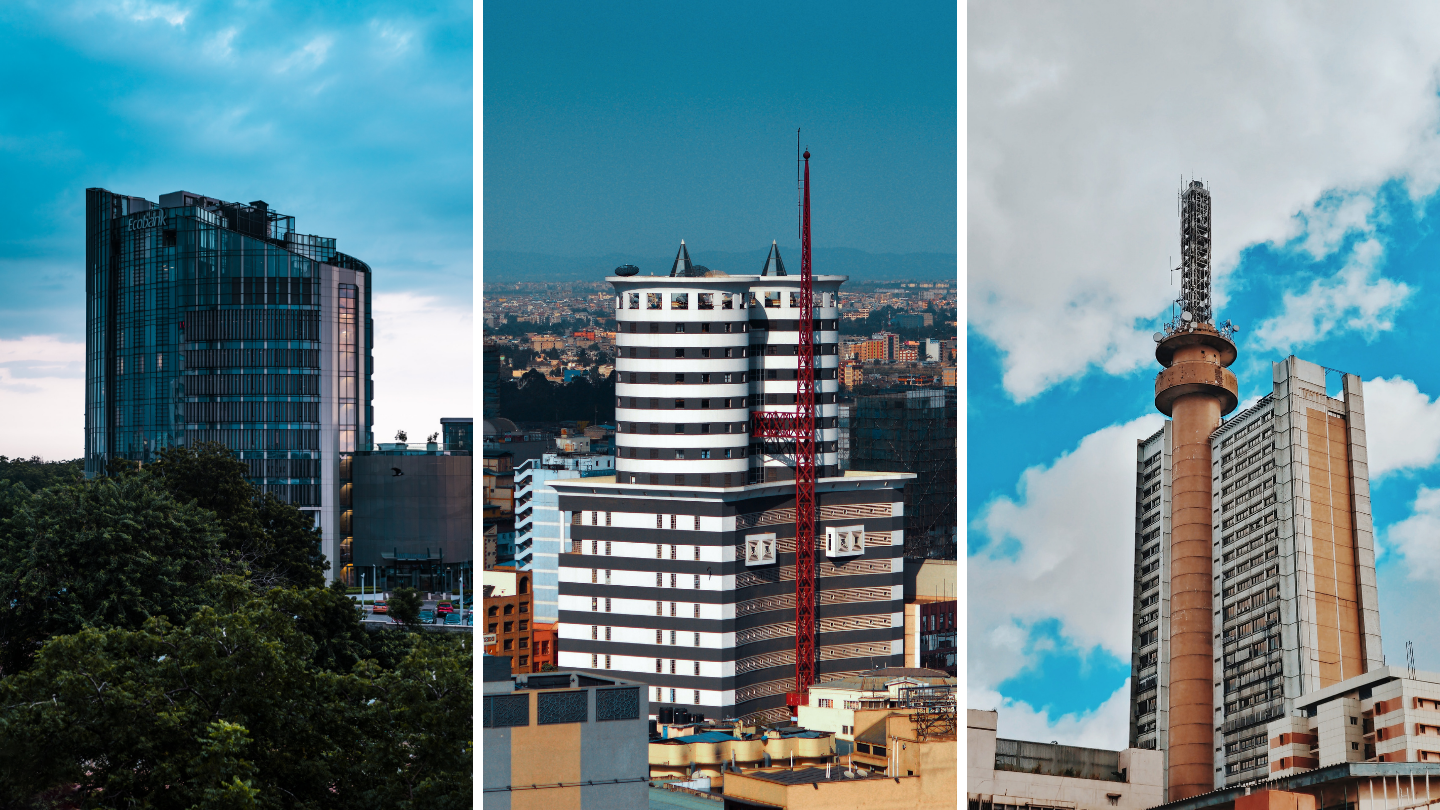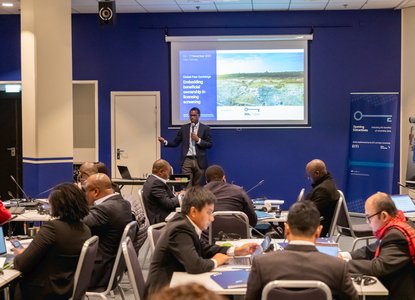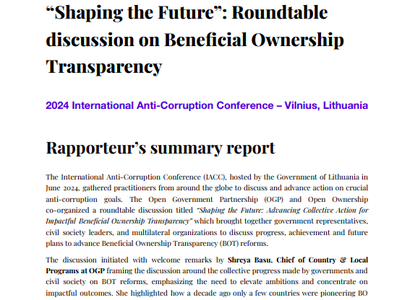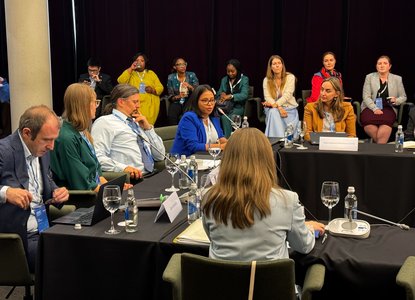Beneficial Ownership reform in Africa: analysing progress in Ghana, Kenya, and Nigeria

Ghana and Kenya recently launched Africa’s newest online central beneficial ownership (BO) registers in October of this year. In August, the much anticipated legislative basis for Nigeria’s central register of persons of significant control (PSC) was enacted through the Companies and Allied Matters Act (CAMA).
These developments in some of Africa’s largest economies and populous nations are the culmination of several years of work developing the necessary technical systems and legislative framework for disclosure of who owns and controls companies.
This progress fulfills important governance and transparency measures to mitigate against corruption, illicit financial flows, and organised crime, and to assist companies with their due diligence and asset recovery, as well as aiding COVID-19 economic recovery efforts.
These early steps taken by Ghana, Kenya, and Nigeria offer useful insights into real-world approaches to some of the complex challenges beneficial ownership transparency (BOT) seeks to address.
Open Ownership (OO) has been working with governments and civil society across Africa since 2017 to provide well developed guidance on the common and context-specific questions that arise throughout the BO implementation journey.
OO offers a brief analysis of the steps taken in these three countries, framed on some of the OO Principles.
Disclosure thresholds
In recent years, implementing countries have been adopting thresholds below the 25% used, for example, by UK Companies House, and cited in the Financial Action Task Force (FATF) recommendation. OO’s draft definition includes a threshold of 5%, reflecting the shift towards lower thresholds in order to minimise potential loopholes for corrupt and criminal enterprises.
Whilst the adoption of any threshold comes with the possibility of some attempts to circumvent, lower thresholds increase the costs and burden of doing so, and act as a dissuasive mechanism. This risk based approach is one that OO recommends in its latest policy briefing on definitions and thresholds.
Nigeria and Ghana are both building on experiences with disclosure thresholds through the publications of extractive sector BO data. For the Nigeria Extractive Industries Transparency Initiative (NEITI) register, a disclosure threshold of between 0- 5% was used. The 5% threshold was carried through in the CAMA Act, which set a threshold of 5% for all persons of significant control.
Whilst Ghana’s Companies Act No 992 provides for a 25% threshold, the implementation of the Act has allowed for a lower threshold for extractive sector companies deemed to be of high corruption risk, and is a major contributor to domestic revenues. Ghana, for example, is currently Africa’s largest gold producer, making this sector at acute risk for corruption and crime. Domestically owned companies will have a 0% disclosure threshold, whilst the foreign-owned companies threshold is set at 5%. In contrast, Kenya has adopted a threshold of 10% for both domestic and foreign persons with ownership and control.
A step further would be to apply a lower threshold where beneficial owners are domestic or foreign politically exposed persons(PEPs), given the particular risk of conflicts of interest posed by this category of persons. In resource rich economies, this is particularly important where elite capture diverts revenues from public benefit.
Public availability of beneficial ownership data
Nigeria’s CAMA has legally provisioned for public access to BO data, in a similar fashion to the UK’s Companies House. The benefits of public access have been well demonstrated through the UK Companies House, in particular for improving the quality of data.
Kenya’s legal provision provides for access only by competent authorities. Alternative means of access for citizens via a court order or with the consent of a beneficial owner is provided. Specific penalties are attached to disclosing BO without the requisite authority, with fines of approximately USD 18,300 or imprisonment. A central, non-public register can be an important first step in the implementation journey towards transparency.
Interestingly, Ghana has gone with a “mixed-method” approach, identifying particular sectors where there is a public interest in disclosure. As it stands, public access to extractive sector company data held by the Registrar-General Department (RGD) will be made available through Ghana EITI reporting. The RGD is taking a phased approach to implementation of its BO register, and regulations for other sectors are in progress.
Sanctions and enforcement
Critical to the effectiveness of BO implementation is the adequacy of enforcement mechanisms as well as relevant enforcement agencies being sufficiently empowered. The OO Principles recommend that sanctions should be prescribed in a manner that is both proportionate and dissuasive, and include both monetary and non-monetary penalties.
Nigeria, as per the CAMA’s provisions, has gone down the route of fines for non-compliance, as well as administrative penalties. Further detail on the amount of the fine will be specified in regulations currently being developed. Whether a fine and administrative penalties are adequate is an important area to consider.
Kenya’s regulations place obligations on companies to issue non-complying beneficial owners with warning notices and restrict the interests of the non-complying beneficial owners. Where non-compliance persists, a company is obliged to report to the Registrar. The regulations may have further guidance on the specifics of this, but as with Nigeria, Kenya may benefit from more substantial enforcement mechanisms.
Growing momentum
The progress in these countries is part of a growing momentum of BO reform. Globally, over 90 countries have made BO reform commitments, and in Africa, over half of the 54 states have a commitment to BOT. Country commitments made through the National Action Plans (NAP) of the Open Government Partnership (OGP) have played an important role in driving reforms through civil society and government co-creation processes.
In 2020, seven countries in Africa – Egypt, Kenya, Nigeria, Senegal, Seychelles, Tanzania, and Zimbabwe, have implemented legal reforms to advance their BO commitments. COVID-19 has also acted as an accelerator for commitments, with countries including South Africa, Nigeria, Cameroon, and Gabon making new sectoral commitments to disclose BO data in procurement expenditure under the International Monetary Fund (IMF) Rapid Financing Instrument loans.
This year has also seen Uganda take its first step towards BOT with its membership to the EITI approved in August. Angola has formally indicated its intent to apply for membership to the EITI as well.
Whilst further work is still required, the progress in Ghana, Kenya, Nigeria, and other countries are encouraging indicators that Africa is firmly part of a growing global momentum of countries adopting measures to reduce the opacity around company ownership. An important next step for all three countries will be designing systems to allow collected data to be structured for easy and timely sharing with other government agencies, the public, and across jurisdictions.
• OO is committed to providing the technical expertise to support this work. If you would like to discuss technical assistance for your country, please contact: Karabo Rajuili, OO country manager at [email protected].


